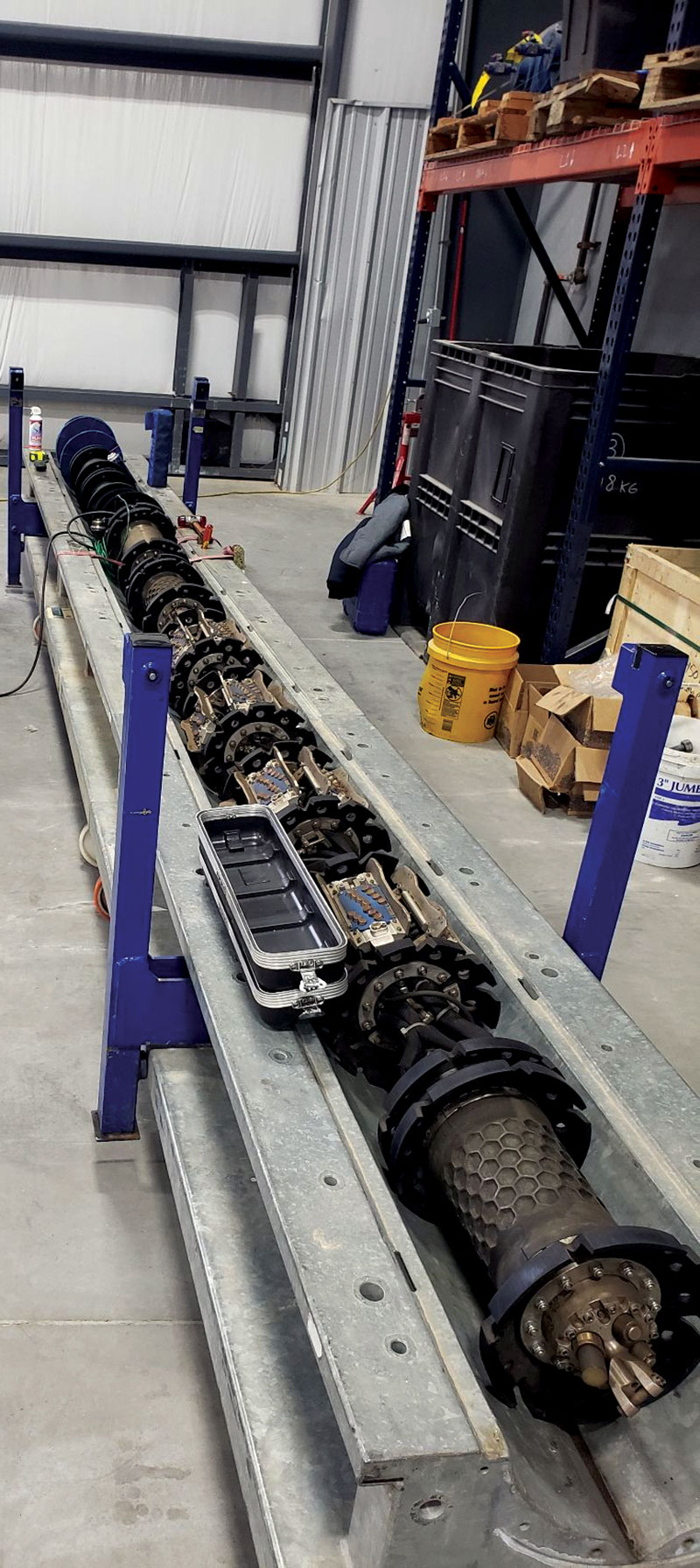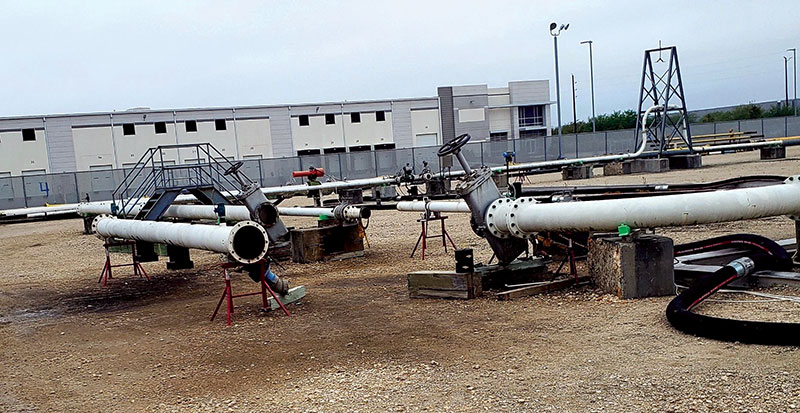May 2021, Vol. 248, No. 5
Features
PRCI Working to Ensure Sustainability Today and Tomorrow
By Cliff Johnson, President, Pipeline Research Council International (PRCI)
The Pipeline Research Council International (PRCI), a non-profit technical association, was initially formed to solve the problem of brittle cracks and after recognizing the immense value of collaboration has continued with decades of a broad range of solutions.

With this core philosophy of collaboration today, PRCI has advanced the development of our research portfolio through the establishment of Strategic Research Priorities (SRP) that will have a key impact on our members and the pipeline industry.
In the last year, PRCI has also completed two state-of-the-art (SOTA) reports in the Emerging Fuels area. A key asset for PRCI to achieve these goals is the PRCI Technology Development Center.
PRCI’s Commitment
Identifying and executing SRPs allows PRCI to collaboratively address key strategic industry initiatives and issues in which there are near term opportunities to develop significant outcomes for the industry in the interest of public safety.

Over twenty important candidate SRPs have already been identified. Through an objective prioritization process supported by data-driven metrics, PRCI approved the following three SRPs for funding in 2020 and 2021:
- Optimize the detection and mitigation of mechanical damage – A key research priority for PRCI is to close the gaps on mechanical damage (MD) research and produce a comprehensive set of guidelines and engineering assessment tools for managing the threat of MD that are aligned with current ILI and NDE inspection technologies. The consolidation of dent and dent management research is the target of this effort. Results will close the gaps on mechanical damage (MD) research and provide all pipeline operators with technically defensible cases to effectively manage deformations identified through condition assessments, and in turn, focus energies and resources to ensure repairs are being made when and where repairs are truly needed.
- Greenhouse gases (GHG) emissions reduction – The pipeline industry has made significant improvements in reducing GHG emissions, there is a drive to address the issue more aggressively through efficiency improvements and reducing methane emissions. The greatest amount of GHG emissions by pipeline transportation stem from the power used to drive compressors and pumps. Even marginal improvements in efficiency of equipment that has high utilization can have a high impact in the reduction of GHG emissions, primarily CO2.
- Pathway to achieving efficient and effective crack management – operators continually strive to make their crack management programs more effective and efficient. The efforts of this SRP will strengthen the management of integrity resources leading to more comprehensive risk reduction, including improved cracking threat risk assessment, as well as improved matching of in-line inspection tools to the threat, and operational practices to mitigate cracking mechanisms will be optimized.
By executing these and future Strategic Research Priorities, PRCI enables a greater focus on the key challenges facing the industry that impede the goal of attaining zero failures.
These also enhance engagement among our members, governments, and the industry by being more strategic and intentional about breaking down the silos to work cohesively as groups that cross disciplines to solve problems. This allows PRCI to lead industry research in a more significant way by making impactful advancements in technology and R&D to improve pipeline safety and performance.
Emerging Fuels
Expanding upon our history of developing research to ensure the safety, integrity, and the reduction of environmental impact by the global pipeline infrastructure, PRCI and our members are committed to providing the technical solutions needed to enable the transmission and storage of emerging fuels – hydrogen and renewable natural gas (RNG).
Based on the recommendations from the SOTA reports completed at the end of 2020, PRCI is developing two initiatives to advance the needed research by establishing the Emerging Fuels Clearinghouse and creating the Emerging Fuels Institute.
The Emerging Fuels Research Clearinghouse (EFRC) will be an online repository of past and active research, as well as research roadmaps to facilitate the coordination and collaboration of research to support the safe and reliable pipeline transportation and storage of new low-carbon fuels.
This site will enable our members, the industry, and the public to understand the opportunities and needs to technically ensure the safety and integrity of the transportation systems. PRCI is working closely with our international partners to advance the EFRC and it will be a truly global effort.
The Emerging Fuels Institute (EFI) will begin as a community of energy and solution providers that will develop and execute the research required to ensure the safe and efficient transportation and storage of these next generation fuels.
The EFI will also explore additional fuels – ammonia, biomethane, biodiesel, CO2, and others – to prepare PRCI members and the pipeline industry to provide the infrastructure needed to embrace these additional products to move to a net zero carbon fueled world.
Enhancing Integrity
When PRCI opened the Technology Development Center (TDC) in Houston, Texas, it became the game changer in a major commitment to address the key issues facing the energy pipeline industry to ensure the safety of the national and international pipeline system.
A world class facility with a flow loop, both dry and wet pull-string tests, and a large amount of workspace including large conference rooms enables PRCI to partner with the industry to enhance the tools that are a key aspect of pipeline integrity management, as well as providing testing opportunities to develop and characterize new nondestructive evaluation tools and techniques.
Supporting these activities, the TDC houses over 1,500 pipe samples with defined and measured defects that allow service companies to work on real world samples to improve inspection technologies and provide a greater degree of assurance of the integrity of pipeline systems.
The opportunity for industry collaboration that the TDC provides was made especially apparent with the commitment and technical expertise of our members. The Strategic Research Priorities that PRCI has developed are devoted to identifying, prioritizing and implementing the industry’s core research objectives and so use every facet of the TDC.
Currently, there are pull strings and flow loops assembled to test smart tools on corrosion, mechanical damage, and cracks. At the center of executing the SRPs is the TDC, the key catalyst for allowing PRCI to expand its research portfolio, including determining ways to introduce emerging fuels in the global energy pipeline for a safer tomorrow.
Editor’s note: PRCI’s mission is to collaboratively deliver relevant and innovative applied research to continually improve the global energy pipeline systems. PRCI was founded in 1952 by a handful of operators looking for answers to ensure pipeline safety and has grown to a global organization developing peer reviewed research that enhances pipeline system integrity. www.prci.org info@prci.org







Comments